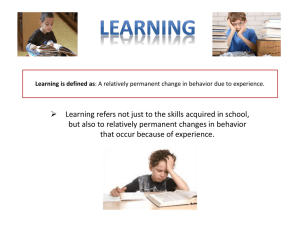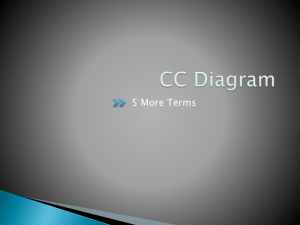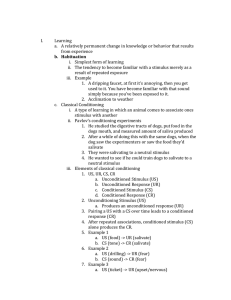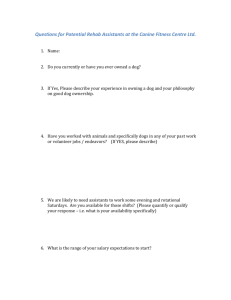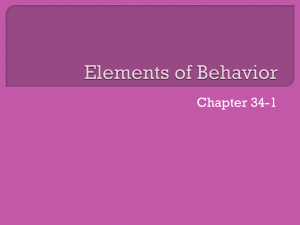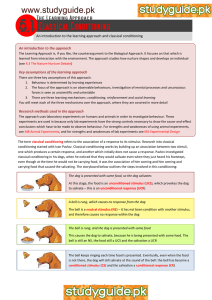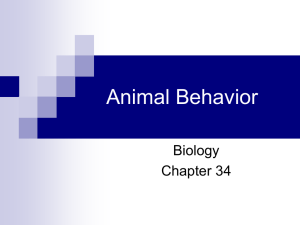Phases of learning!
advertisement
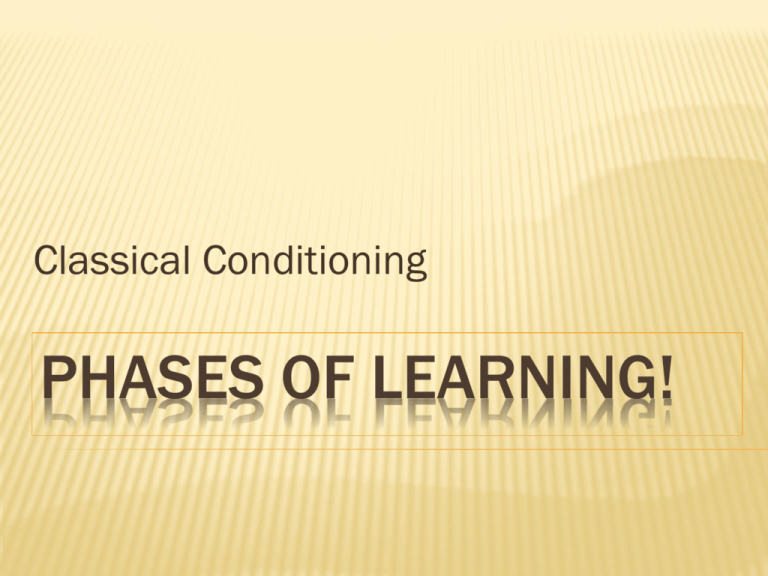
Classical Conditioning PHASES OF LEARNING! PHASES OF LEARNING: ACQUISITION PHASE Consists of repeated trials in which the CS and US are paired and the CR gradually develops Most efficient conditioning occurs when: CS slightly precedes US CS comes to serve as a cue for the US (example: flicker lights just before saying “class, we are going to have a pop quiz today”) HOWEVER, conditioning will still occur if the two stimuli are presented simultaneously. PHASES OF LEARNING: THE EXTINCTION PHASE Presentation of the US is discontinued Immediately following discontinuation of the US the CR will still occur, but will eventually stop. After the CR stops, the behavior is considered extinct. Example: If I condition you into thinking that flickering the lights means we will have a pop quiz and then I never give you the pop quiz, you will start to disassociate the meaning. PHASES OF LEARNING SPONTANEOUS RECOVERY The spontaneous return of a conditioned response followed by extinction. Example: All summer long, you do not operate under a school bell schedule, but immediately after your arrival back to SAHS, you remember what to do when the bell rings! PHASES OF LEARNING: RECONDITIONING The process of relearning a conditioned response following extinction—only one or two pairings are needed. Similar to spontaneous recovery, but the learning process is needed, just for a short period of time. (Maybe upon arriving back to SAHS, you need the entire day to remind you what the bell schedule is all about). STIMULUS GENERALIZATION The transfer of a learned response to a different, but similar stimuli Example: CS= large black dog CR= fear Stimulus Generalization: Fear of small black dog or large spotted dog or medium sized brown dog (aka all dogs scare you!) STIMULUS DISCRIMINATION Learning to respond to one stimulus and to inhibit the response to all other stimuli. Example: CS= large black dog CR= Fear Stimulus Discrimination= No fear of a small brown dog or large white dog (etc). Only large black dogs scare you! TASTE AVERSION: THE GARCIA EFFECT The conditioned avoidance of “poisonous” foods Even if there has been a long interval between eating the food and becoming ill Or even if there is only one pairing Examples from your life experiences? PHOBIAS Intense irrational fear of a particular thing Can lead to panic attacks You have no reasonable explanation as to why you are afraid of this given thing. Examples? DESENSITIZATION THERAPY Conditioning technique to gradually reduce anxiety of a particular object or situation Example: Peter’s fear of rabbits Usually the therapy gradually exposes you to your fear until you learn there is no harm.


